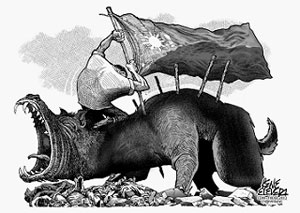
“Before you, Filipino Public Official, launch your pandering, hollow worship of Nelson Mandela, keep this in mind: he was a champion of human rights,” Conde wrote in his Facebook account last Dec. 6.
Mandela’s burial had yet to be scheduled but already there were reports that a massive crowd and world leaders will pay their respects to Mandela, who spent most of the prime of his life fighting apartheid in his home of South Africa and later led the country in his twilight years as president.
Any Filipino student with a passing knowledge of world history would be familiar with Mandela’s career and how he became a world symbol of the war against apartheid along with US evangelist Martin Luther King and Archbishop Desmond Tutu and even the radical Malcolm X.
Mandela shared some similarities with Malcolm X, being an activist who supported armed struggle against the apartheid system which had pervaded the socio-cultural fabric of society.
While he was branded a “Marxist terrorist,” his opening words in the proposed Freedom Charter of the African National Congress belied the label:
“We, the people of South Africa, declare for all our country and the world to know: That South Africa belongs to all who live in it, black and white, and that no government can justly claim authority unless it is based on the will of the people.”
These words ring true not only to South Africa but across countries who still believe and uphold the basic tenets of freedom and individual and collective human rights; countries like the Philippines, where the current crop of officials sadly couldn’t even be spoken in the same breath as Mandela, President Benigno Aquino III’s parents and the national heroes of old.
Want to speak about human rights? The murder of a radio broadcaster in Tandag City, Surigao del Sur last Dec. 6 came on the heels of the killing of a Bukidnon province blocktimer last Nov. 29.
The country may not have deteriorated into a state of total lawlessness. In fact has shown the world the collective courage of its people in standing up from the rubble and devastation caused by supertyphoon Yolanda.
But it still has its work cut out in protecting not only the lives of Filipinos but also those who don’t agree with the policies of its government.